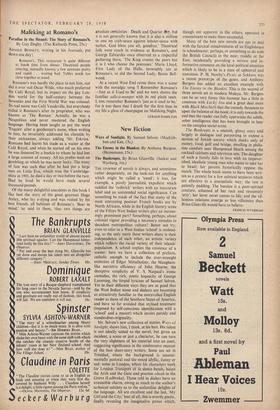New Fiction
THE reviewer of novels is always, and sometimes rather desperately, on the look-out for anything which might be called a 'trend'; it was, for example, a purely journalistic expedient which saddled the 'redbrick' writers with an inaccurate label and an unintended social significance. Can something be made of the fact that many of the most interesting postwar French books are by North Africans, while in the English literary scene of the Fifties West Indian writers play an increas- ingly prominent part? Something, perhaps, about colonial vigour providing a necessary stimulus to decadent metropolitan culture? Better not try; even to refer to a West Indian 'school' is mislead- ing, as the only merit these writers share is their independence of each other, an artistic variety which reflects the racial variety of their islands' population. .A school implies the existence of a master; here we have a collection of prefects, catholic enough to include the over-wrought eroticism of Edgar Mittelholzer, the Maugham- like narrative efficiency of John. Hearne, the deceptive simplicity of V. S. Naipaul's ironic coniedies, the rich, poetic loquacity of George Lamming, the limpid lyricism of Samuel Selvon. Yet in their different ways they are so good that the West Indian scene and dialects are becoming as attractively familiar to the untravelled English reader as those of the Southern States of America, and have so far avoided that stylised treatment (imposed by self-conscious identification with a 'school' and a master) which invites parody and standardises originality.
Mr. Selvon's new collection of stories, Ways of Sunlight, shoWs him, I think, at his best. His talent is not ideally suited to the novel, but given an incident, a scene or just a character, he can turn the very slightness of his material into an asset, suggesting significance in the unobtrusive manner of the best short-story writers. Some arc set in Trinidad, where the background is unsenti- mentally pastoral and the-mood idyllic, funny or sad; some in London, where his charaCters work for LOndoil TransPort or 'in dance bands, haunt the Arch and the Gate and practise obeah in the Grove (Ladbroke). Those told in dialect have an irresistible charm, owing as much to the author's technical subtlety as to the unfamiliar delights of the language. All are excellent and the last, 'My Girl and the City,' best of all; this is overtly poetic, finally revealing the imaginative power which,
though not apparent in the others, operated in concealment to make them successful.
Many of the best new novels are apt to deal with the farcical misadventures of an Englishman (a schoolmaster, perhaps, or something to do with the British Council) in the near, middle or far East, incidentally providing a serious and in- formative comment on the local political situation which is likely to be in a state of upheaval and transition. P. H. Newby's Picnic at Sakkara was a recent prototype of the genre, and Anthony Burgess has added an excellent example with The Enemy in the Blanket. This is the second of three novels set in modern Malaya. Mr. Burgess can be so very funny (his humour has a little in common with Lucky Jim and a great deal more with Black Mischief) that the comedy threatens to upset the balance of the book; it is only towards the end that the reader can fully appreciate the subtle, sober intelligence that has been brought to bear on the complex social scene.
The Bankrupts is a smooth, glossy story told largely in dialogue and purporting to expose a section of Jewish society which thinks only of money, food, golf and bridge, dwelling in philis- tine comfort near Hampstead Heath among the cocktail cabinets and television sets. The daughter of such a family falls in love with an impover- ished, idealistic young man who wants to take her to Israel; her parents hysterically oppose the match. The whole book seems to have been writ- ten as a pretext for a few satirical setpieces which are effective in a journalistic way; the rest is patently padding. The heroine is a poor-spirited creature, ashamed of her race and tiresomely `arty'; her lover never comes to life; and the vil- lainous relations emerge as less villainous than Brian Glanville would have us believe.
FRANCIS WYNDHAM


































 Previous page
Previous page